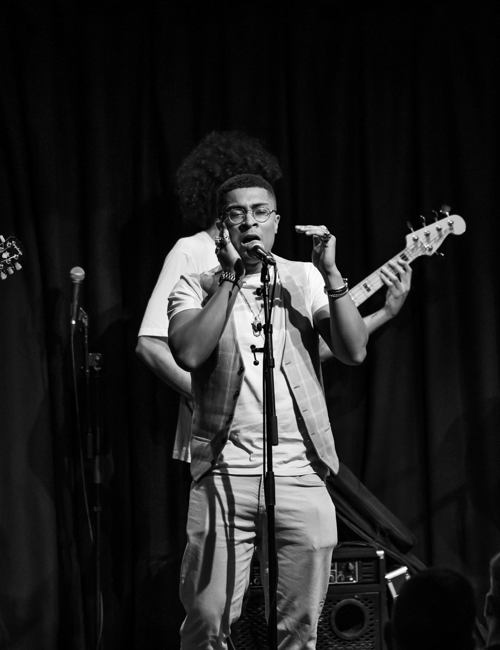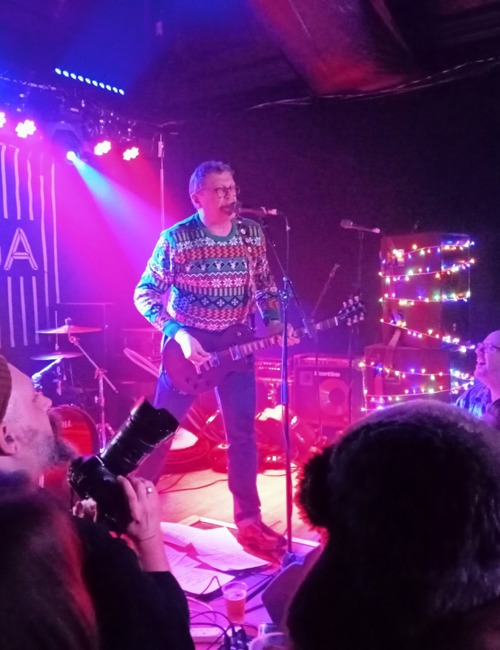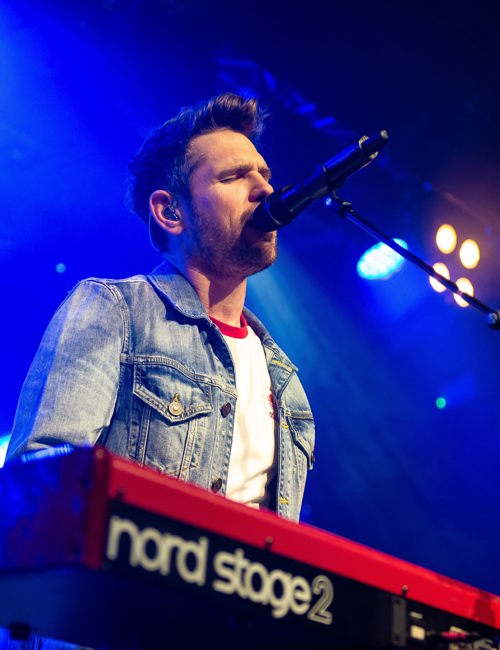
photo: Dom Henry
Former NYO member and artistic director James Lowe, popped back to conduct the main orchestra. The Notts-born musician is currently living it up in Berlin, and spends his time working as chief conductor of the Prussian Chamber Orchestra and the Vaasa Sinfonia.
How did you first get into conducting?
I had a gap year between school and studying at the University of Edinburgh. I was contacted by Duncan Lloyd who conducted the Djanogoly Community Orchestra as they needed an extra viola for a concert. He suggested I conduct something in the next rehearsal, after which he generously gave me his orchestra for the whole year. I was also playing in the Nottingham Youth Orchestra and Derek Williams gave me a couple of chances to stand up in front of my friends. After university, I studied conducting in various masterclasses and conducting became my full time occupation.
When choosing members of your orchestras, are there certain skills that you look for?
Every orchestra has its own audition protocols. Nowadays, everyone is so well taught, they can technically do pretty much anything. However, being able to communicate something that lies behind the notes is the most important factor. Also, having a superb musician who radiates unpleasantness is far worse than someone technically less perfect who really wants to connect with their colleagues.
Do you have complete responsibility in choosing the programme? Do you enjoy the challenge of interpreting a piece in your own way?
With my own orchestras, I decide, given various financial and personnel constraints and taking into account what the players would like. I then sit with hundreds of file cards and try to put together the jigsaw. It’s one of the hardest but hugely satisfying parts of the job. Interpretation is a loaded word. Bernard Haitink wondered why we have to ‘interpret’ – why can’t we just play the music?
You’ve conducted for the Prussian Chamber Orchestra and the Tokyo Philharmonic. Do you adjust your style for each orchestra?
Every country has a different way of playing, and every single orchestra is different. The main approach is always the same – see what they offer and try to grow something together during rehearsals that reflects what I believe the composer wanted.
What’s the classical music scene like in Nottingham?
Although Nottingham has no professional symphony orchestra, it’s exceedingly rich for non-professional music making. I hate the word ‘amateur’ as it suggests something to be looked down upon. The Nottingham Philharmonic in particular remains one of the finest non-pro bands in the UK.
Do you think that Nottingham is a good place to be for aspiring classical musicians?
There’s so much going on in Nottingham, it’s always possible to find some great playing experience. Sadly, the instrumental tuition service that I benefited from is now very much cut down. I worry that kids from my background don’t have the opportunities that I had. That’s a national problem, but one that I find extremely depressing – classical music shouldn’t just be the preserve of a few.
What upcoming events can we look forward to?
Well, it’s not a public event, but we are shipping the orchestra up to Leeds in September to play alongside the Orchestra of Opera North. That’s the first time the Nottingham Youth Orchestra will have played within a professional orchestra – I hope we blow a few players’ minds with what’s possible…

photo: Dom Henry
If you watched Britain’s Got Talent last year you may have seen Nottingham’s Kanneh-Mason Family Orchestra reach the semi-finals. A bunch of musically talented siblings, the eldest, Isata was a soloist at the NYO’s anniversary concert…
What first drew you towards music?
Originally, my piano lessons were just a hobby. It wasn't until I was ten and started going to the Junior Royal Academy of Music that I started thinking about doing it professionally. I really admired [pianist] Marta Argerich.
You’ve had masterclass tuitions with great pianists including Nelita True and Howard Shelley – in what ways have they influenced the way you play?
It has massively helped my technique. I feel it’s important to get as many different opinions as possible while you are still trying to find your own style, because then you have a wide range of ideas to choose from.
What was it like being a soloist for the Nottingham Youth Orchestra?
It was amazing, partly because I used to play in the orchestra when I was younger so it was lovely to come back. Also, it gave me a chance to perform a concerto that I have loved all my life.
How does playing with your siblings compare to playing with an orchestra?
It’s different because we are so used to each other's styles and ways of playing. A lot often goes unsaid during rehearsals as it is done instinctively.
Were there many musical opportunities for you when you were growing up?
There were lots of opportunities for music lessons and there were also many local orchestras, festivals and competitions. I took advantage of a lot of these, and one of my first public experiences was competing in the Nottingham Music Festival.
You’re the youngest winner of the Nottingham Young Musician of the Year, and performed in the BBC’s Young Musician of the Year competition. How was that?
BBC Young Musician was by far the most intense competition I've competed in so far. Although I’ve done other competitions, the fact that the BBC one is televised and such a big deal made it all the more intense.
How do you go about choosing your repertoire?
For concerts and competitions, I usually pick whatever I am learning, which is usually what I love the most at the time. In general, I find myself drawn to Chopin and Beethoven, but I play a wide range of composers.
What advice would you give to other young musicians?
As a young person, I was always struggling to fit my instrument practice in around my studies, but if you love music enough then it's always worth making the time.
Your family orchestra reached the semi-final of Britain’s Got Talent last year...
We originally entered the competition because we were approached, but once we were on it, we just wanted to have a good time and bring some enjoyment to musicians and non musicians alike. I feel that the experience was useful because it was a difficult audience to perform for, and as a result, has made us more versatile and resilient.
You’re a proper talented bunch. Is it in your genes?
I’m not really sure how my siblings and I ended up all doing music – my parents never planned this and certainly did not expect us all to take to it so much. Perhaps it was a sort of domino effect, and now we all influence and inspire each other.
How often do you perform with your family?
Since BGT, my family and I have performance opportunities quite frequently, although we have not yet been offered a tour...
Up and coming Nottingham Youth Orchestra performances include Sunday 3 July at the Albert Hall and Friday 5 August at St Barnabas Cathedral.
We have a favour to ask
LeftLion is Nottingham’s meeting point for information about what’s going on in our city, from the established organisations to the grassroots. We want to keep what we do free to all to access, but increasingly we are relying on revenue from our readers to continue. Can you spare a few quid each month to support us?




